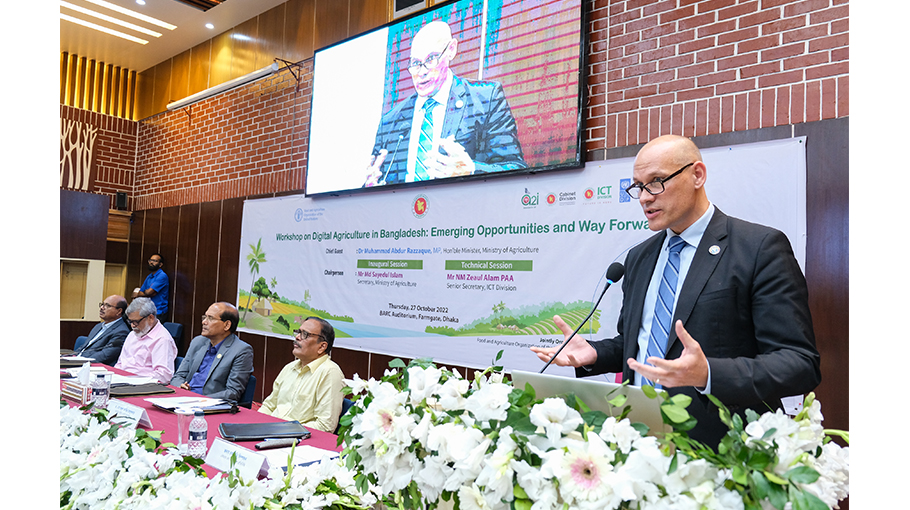Digitalisation of agriculture needed for Bangladesh’s food security
Experts opine at FAO workshop

With a growing population and facing climate change challenges, digital agriculture can deliver Bangladesh with the boost in productivity that is needs to secure food and nutrition security for decades to come.
This was one of the main conclusions of a workshop on Thursday to discuss digital opportunities in agriculture.
The event, held at the BARC auditorium in Dhaka, was organized by the Food and Agriculture Organization of the United Nations (FAO) in collaboration with Aspire to Innovate (a2i).
FAO Senior Economist Carlo Bravi gave a presentation on how digital technology is being used to improve food system sustainability.
Md. Sayedul Islam, Secretary, Ministry of Agriculture, chaired the inaugural session at which the special guests were Dewan Muhammad Humayun Kabir, Project Director of a2i, Information, Communication and Technology (ICT) Division, and Shaikh Mohammad Bokhtiar, Executive Chairman, Bangladesh Agricultural Research Council (BARC).
The technical session was chaired by Md. Abdus Salam, Member Director (Current Charge), Planning and Evaluation Division, BARC. Chief guest was N M Zeaul Alam PAA, Senior Secretary, ICT Division.
Digital innovations in agriculture, from mobile phones and internet connectivity for smallholder farmers, to drones, and more advanced technology, have the potential to drive agricultural transformation in the country. Speaking at the event, FAO Representative in Bangladesh Robert D. Simpson, said: “Digital transformation of agriculture is already here and it’s here to stay. Bangladesh is just starting on the road to adopting digital technologies and both the Government and FAO are committed to doing all we can to encourage its uptake. Digitalization of agriculture will boost productivity, helping to meet increasing demand for food as the population grows, and to fulfil ambitions for increased food exports.”
At the same time as rapid population growth, the availability of natural resources such as fresh water and productive arable land is becoming increasingly constrained. Urbanization is also having important implications for patterns of food production and consumption.
Smallholder farmers connected with FAO’s Digital Village Initiative can access various e-services from the government and private sector and can take advantage of digital literacy training.
There are 60 digital villages across Barishal, Rangpur, and Cox's Bazar. The centres also serve as information exchange hubs for farmers. They are operated by producer organisations which run 57 virtual call centres to aggregate produce for collective marketing and facilitation of bulk procurement of agricultural inputs.


